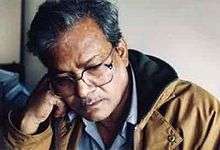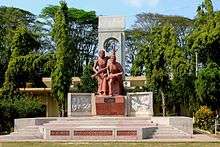Nitun Kundu
| Nitun Kundu | |
|---|---|
 | |
| Native name | নিতুন কুন্ডু |
| Born |
3 December 1935 Dinajpur district, Bengal Presidency, British India (now Bangladesh) |
| Died |
15 September 2006 (aged 70) Dhaka, Bangladesh |
| Occupation | Sculptor, painter and entrepreneur |
| Awards | Ekushey Padak |
Nitya Gopal Kundu (3 December 1935 – 15 September 2006) was a Bangladeshi artist, sculptor and entrepreneur. He founded the furniture company Otobi.[1]
Early life
Kundu was born in Dinajpur district to his parents Gnanendranath Kundu and Binapani Kundu. He was the fourth among seven siblings. Kundu was married to Phalguni Kundu and had a daughter Amity and a son Animesh.
Education and early career
Kundu graduated from Dhaka Art College (now the Institute of Fine Arts) in 1959.[2] In the years leading up to 1971, he worked at the United States Information Service (USIS) in Dhaka designing exhibits and graphics.[3]
Liberation War
During the Bangladesh Liberation War, Kundu worked with the artist Quamrul Hassan at the public relations department of the Bangladesh Government-in-Exile at Mujibnagar. In collaboration with Hassan and a group of notable artists namely Debdas Chakraborty, Nasir Biswas, Pranesh Mandal and Biren Shome; Kundu worked on numerous posters and works of art aimed at arousing the newly formed Mukti Bahini liberation army and also raising awareness of the genocide being unleashed by the Pakistan Army on the people of Bangladesh.
It was during this period he designed two posters which became among the most recognized[4] works of art produced during the war. They were titled Sada Jagrata Banglar Mukti Bahini and Banglar Hindu, Banglar Bouddha, Banglar Christian, Banglar Musalman; Amra Sabai Bangali.
The Liberation War was the inspiration for Kundu's most famous work, the sculpture Shabash Bangladesh, a tribute to the fallen freedom fighters of the Mukti Bahini. This is situated on the campus of Rajshahi University.[5]
Entrepreneur
In the 1975, following a brief stint at Bitopi advertising agency, Kundu established his own company, a furniture store featuring his own designs, Otobi. Within a relatively short period, Otobi became the most prominent Bangladeshi furniture brand. He started the company with an initial investment of 5000 taka.[4]
Works

Kundu crafted several national trophies including National Film Award, President Gold Cup, Notun Kuri Award, Asia Cricket Cup, and the Ekushey Padak.[1]
His some notables works are the following:
- Sada Jagrata Banglar Muktibahini (poster)
- Amra Sabai Bangali (poster)
- Banglar Bir Muktijoddha (poster)
- Shabash Bangladesh (sculpture at University of Rajshahi)
- SAARC Fountain at Karwan Bazar, Dhaka
- Fountain, Dhaka High Court, Dhaka
- Sampan, Shah Amanat International Airport, Chittagong
- Kadam Fountain, National Press Club, Dhaka
Awards and honors
- Ekushey Padak (1997)
- Daily Star-DHL Best Entrepreneur Award
- National Film Award
- President Gold Cup
- Notun Kuri Award (Bangladesh Television)
References
- 1 2 "Artist Nitun Kundu passes away". The Daily Star. 16 September 2015.
- ↑ Hossain, Takir. "Liberation War in art". The Daily Star. Retrieved 10 July 2015.
- ↑ Kristula, Michael (December 2012). "Nitun Kundu: A Success". Foreign Service Journal: 34. Retrieved 8 November 2015.
- 1 2 "Nitun Kundu: Our role model". The Daily Star. Retrieved 10 July 2015.
- ↑ Mirdha, Refayet Ullah. "The 75,000 taka bed". The Daily Star. Retrieved 10 July 2015.